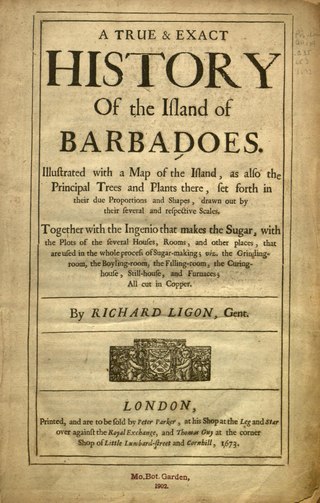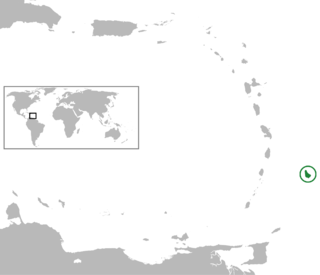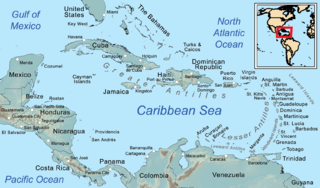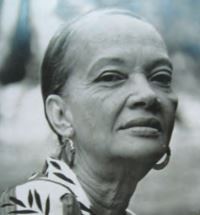Related Research Articles

Barbados is an island country in the Lesser Antilles of the West Indies, in the Caribbean region of the Americas, and the most easterly of the Caribbean Islands. It occupies an area of 432 km2 (167 sq mi) and has a population of about 287,000. Its capital and largest city is Bridgetown.
Barbados is an island country in the southeastern Caribbean Sea, situated about 100 miles (160 km) east of Saint Vincent and the Grenadines. Roughly triangular in shape, the island measures some 21 miles (34 km) from northwest to southeast and about 14 miles (23 km) from east to west at its widest point. The capital and largest town is Bridgetown, which is also the main seaport.
Afro-Caribbean people or African Caribbean are Caribbean people who trace their full or partial ancestry to sub-Saharan Africa. The majority of the modern African-Caribbeans descend from Africans taken as slaves to colonial Caribbean via the trans-Atlantic slave trade between the 15th and 19th centuries to work primarily on various sugar plantations and in domestic households. Other names for the ethnic group include Black Caribbean, Afro or Black West Indian or Afro or Black Antillean. The term Afro-Caribbean was not coined by Caribbean people themselves but was first used by European Americans in the late 1960s.

Frank Appleton Collymore MBE was a Barbadian literary editor, writer, poet, stage performer and painter. His nickname was "Barbadian Man of the Arts". He also taught for 50 years at Combermere School, where he sought out and encouraged prospective writers in his classes, notably George Lamming and Austin Clarke. Collymore was the founder and long-time editor of pioneering Caribbean literary magazine BIM.

Sir Lloyd Erskine Sandiford, KA, PC is a Barbadian politician. He served as the fourth prime minister of Barbados from 1987 to 1994. Later Sir Lloyd served as Barbados' first resident ambassador in Beijing, China from 2010 to 2013.
Leslie Arthur Walcott was a West Indian cricketer who played for Barbados between 1925–26 and 1935-36 as a batsman, off-spinner and, in 1934-35, wicket-keeper.

Richard Ligon (1585?–1662), an English author, lost his fortune as a royalist during the English Civil War (1642-1651), and during this turbulent time in England he found himself, as he notes in his narrative, a "stranger in my own country.” On 14 June 1647, he left for Barbados to gain his fortune in the New World, like many of his fellow countrymen. Ligon purchased half of a sugar plantation in Barbados. After two years residence on the island he was attacked by a fever, and returned to England in 1650. He was soon afterward put into prison by his creditors. There are conflicting reports as to whether his narrative was conceived of in prison as a way to pay off his creditors and gain his freedom, or before his imprisonment at the urging of Brian Duppa, Bishop of Salisbury. His work, a folio with maps and illustrations, is entitled A True and Exact History of the Island of Barbados and was published in London in 1657 and again in 1673.

The following is an alphabetical list of topics related to the nation of Barbados.

Combermere School is a school in Barbados, notable as one of the oldest schools in the Caribbean, established in 1695. Its alumni include several leading cricketers, David Thompson, sixth prime minister of Barbados and other politicians, several authors and the singer Rihanna. In its first 75 years, the school "provided the Barbadian community with the vast bulk of its business leaders and civil servants " and it is "perhaps the first school anywhere to offer secondary education to black children".
A Jewish population has been in Barbados almost continually since 1654.
Wolmer's Schools in Kingston, Jamaica, consists of Wolmer's Pre-School, Wolmer's Preparatory School and two high schools: Wolmer's Trust High School For Girls and Wolmer's Trust High School for Boys. While acknowledged as separate institutions, each school carries the same crest, motto, "Age Quod Agis", a Latin phrase that translates as "Whatever you do, do it well". They also use the same school song. Wolmer's Schools closely resemble British schools of the 1950s more than those today, a trend that can be noted of the entire Jamaican schooling system. Wolmer's Boys' and Girls' have been deemed some of the top schools in the Caribbean and from most sources it has been recognized as apart of the top ten schools in Jamaica and in the region. Wolmer's Girls' was ranked second, after Glenmuir High School, in the Reform of Education in Jamaica 2021 for top value-added traditional/secondary school in the island, with St. Jago High School ranking fifth.
Clennell Wilsden Wickham was a radical West Indian journalist, editor of Barbadian newspaper The Herald and champion of black, working-class causes against the white planter oligarchy in colonial Barbados during the inter-war period, leading to the social unrest that triggered the Riots of 26 July 1937.
Empire Cricket Club is a cricket club in Barbados. The club plays in Barbados Cricket Association Division 1 championship. The club was formed on 24 May 1914—Empire Day—from which it took its name. The club was formed by a defection of disaffected members of Spartan Cricket Club, when Spartan had refused membership to the "socially inferior" Barbadian cricketer Herman Griffith in 1913.
Harry Wakefield Ince was a Barbadian cricketer who represented West Indies in matches before they attained Test match status.

Black Barbadians or African Barbadians are Barbadians of entirely or predominantly African descent.
Andrea Stuart is a Barbadian-British historian and writer, who was raised in the Caribbean and the US and now lives in the UK. Her biography of Josephine Bonaparte, entitled The Rose of Martinique, won the Enid McLeod Literary Prize in 2004. Although her three published books so far have been non-fiction, she has spoken of working on a novel set in the 18th century.

Irish indentured servants were Irish people who became indentured servants in territories under the control of the British Empire, such as the British West Indies, British North America and later Australia.

Dame Elsie Payne was a teacher and following independence she became the first Barbadian-born principal of Queen's College in Bridgetown. She was the first woman knighted in Barbados for her long dedication to education and the nation.
Keith Arlington Patrick Sandiford GCM is a Barbadian-born Canadian historian. He has been professor emeritus at the University of Manitoba since 2002.
References
- ↑ Keith A. P. Sandiford and Earle H. Newton, Combermere School and the Barbadian Society, University of the West Indies Press, Kingston, 1995, p. 147.
- 1 2 "Dr Keith Sandiford". LSU. Retrieved 18 July 2018.
- ↑ "The Evolution of Racial and Political Consciousness in Three Black Writers of Eighteenth-Century England". IDEALS. Retrieved 18 July 2018.
- ↑ Keith A. Sandiford, Measuring the Moment, Susquehanna University Press, Selinsgrove, 1988, p. 182.